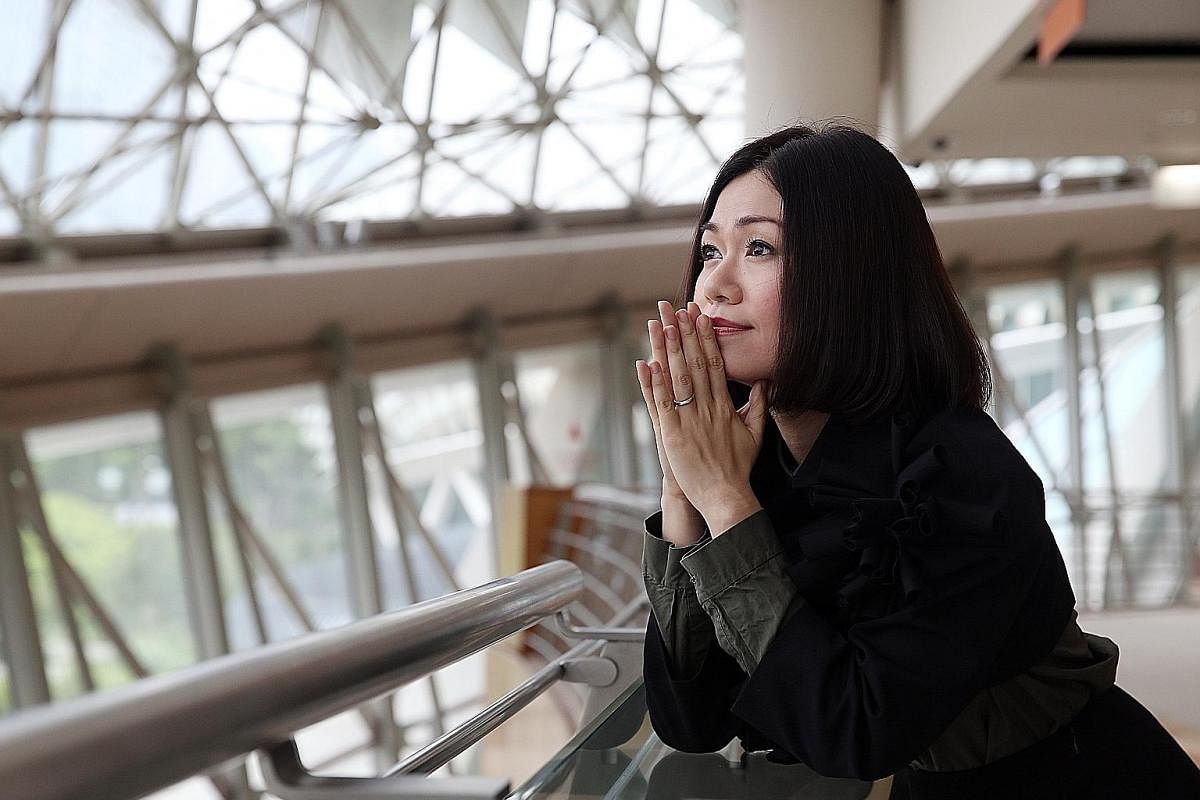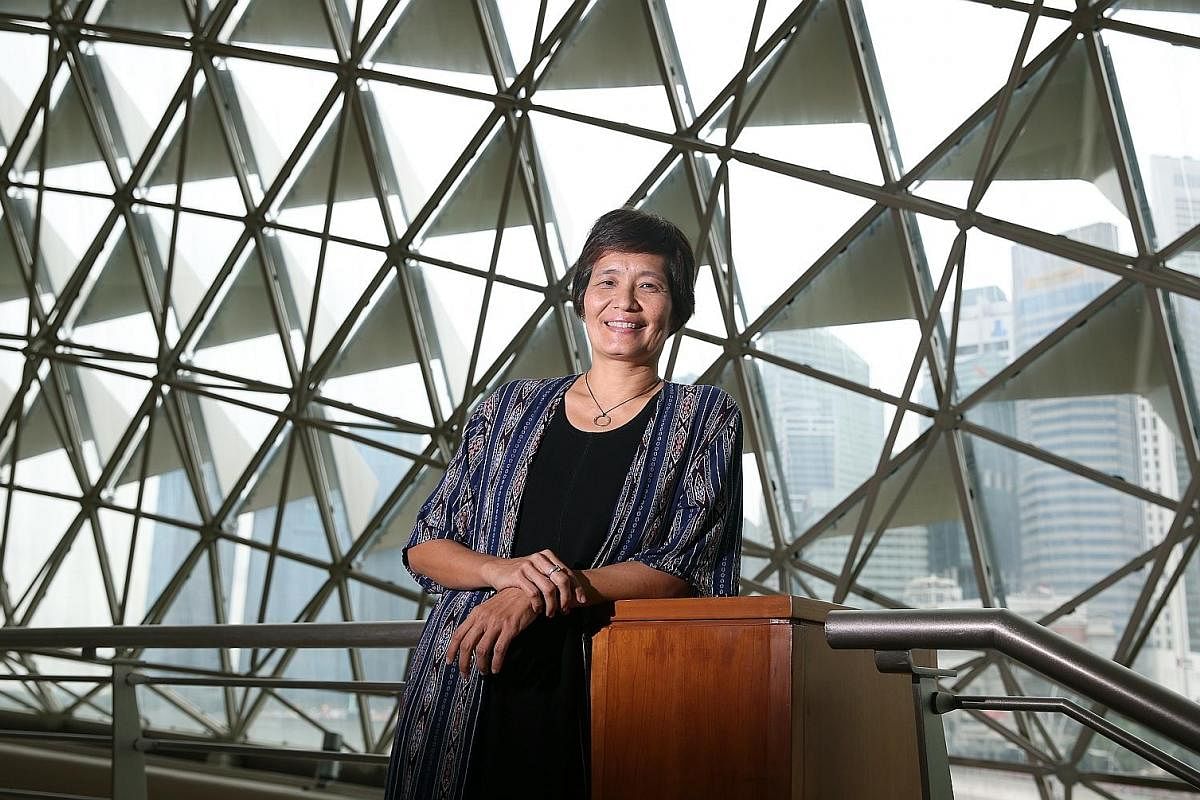-
HIGHLIGHTS OF HUAYI
-
I Came At Last To The Seas
Where: Esplanade Theatre, 1 Esplanade Drive
When: Feb 23 and 24, 8pm
Admission: $38 to $118
Blood And Rose Ensemble
Where: Esplanade Theatre Studio, 1 Esplanade Drive
When: Feb 23, 8pm; Feb 24 and 25, 3 and 8pm
Admission: $38
The Dragon's Song - An East-West Fusion Concert
Where: Esplanade Recital Studio, 1 Esplanade Drive
When: Feb 24 and 25, 5pm
Admission: $35
Why We Chat?
Where: Esplanade Theatre
When: March 1 to 3, 7.30pm; March 4, 2.30pm
Admission: $38 to $128
Cut Kafka!
Where: Esplanade Theatre Studio
When: March 1 and 2, 8pm; March 3, 3 and 8pm; March 4, 3pm
Admission: $38
Einstein In The Carpark
Where: Esplanade B2 Carpark
When: March 1, 8pm; March 2, 8 and 11.30pm; March 3, 4 and 8pm; March 4, 4pm
Admission: $38
• All tickets from Sistic (call 6348-5555 or go to www.sistic.com.sg). For more information, go to www.esplanade.com/huayi
Unusual collaborations headline Huayi 2018
Hybrid works are the highlights of this year's festival



"If at first the idea is not absurd," said theoretical physicist Albert Einstein, "then there is no hope for it."
Indeed, a play that takes Einstein, ancient Chinese kunqu opera and musical theatre and muddles them in a basement carpark might seem the height of absurdity.
But combining unlikely ingredients to create strange new flavours, as local theatre group Emergency Stairs is doing with its experimental work Einstein In The Carpark, seems to be the recipe for this year's Huayi Chinese Festival of Arts, which runs from Feb 23 until March 4.
From a suona jazz concert to I Came At Last To The Seas, an ambitious, hybrid work on migration starring Sing! China finalist Joanna Dong, the 16th edition of the annual festival by Esplanade - Theatres on the Bay is taking a chance on curious combinations.
Finding affinity in disparity is the thread that binds together I Came At Last To The Seas, a meditation on diaspora and displacement.
Directed by The Theatre Practice's Kuo Jian Hong, it is Huayi's first local commission for the 2,000-seat Esplanade Theatre. It weaves together six journeys - from a conductor returning home with his grandfather's ashes to a young boy meeting a middle-aged version of Antoine de Saint-Exupery's Little Prince - while delving into the six roots of sensation in Buddhist philosophy.
An immune system will sometimes reject an alien organ even if it needs it to survive, says Kuo, 49, just as immigrants struggle to integrate into society. "In one way or another, we are all constantly negotiating this idea of displacement."
The multimedia production, which Kuo describes as "a dialogue between film and theatre", brings together local stars such as Dong and actor Sugie Phua with performers from across Asia, such as Rosa Maria Velasco from Hong Kong and Ethan Wei from Taiwan.
Dong, 36, plays a woman desperate for a transplant to replace a certain body part, which she declines to reveal as it is a spoiler.
She is no stranger to musical theatre: She won Best Supporting Actress at the 2008 Straits Times Life! Theatre Awards for her role in Mandarin musical If There're Seasons.
Her involvement in I Came At Last To The Seas began two years ago, preceding her Sing! China fame. "The competition made me very aware of my identity as a Chinese person who is not from China," she says.
More unlikely bedfellows join forces in Cut Kafka!, in which local groups T.H.E. Dance Company and Nine Years Theatre collaborate for the first time. They are drawing on writer Franz Kafka, known for his nightmarish, existential works such as The Metamorphosis.
Kafka, says Nine Years Theatre artistic director Nelson Chia, 46, was very influenced by Taoism, particularly the writings of fourthcentury philosopher Zhuang Zi.
Melding dance, theatre and text requires a difficult balance, he adds. "The world we have created on stage is a space that can be described as a writer's mind, where we can say that what is unfolding is us dreaming about the writer as well as the writer writing about us."
Kafka, says T.H.E. artistic director Kuik Swee Boon, 45, in Mandarin, will resonate with Singaporeans. "We have created a system that is highly productive and practical, but at the same time, people are starting to feel trapped in an endless cycle of productivity with no end in sight. I would say this phenomenon is fairly Kafka-esque."
East meets West, too, in The Dragon's Song, a concert featuring Chinese musician Guo Yazhi playing pop and jazz tunes on the suona, a traditional Chinese wind instrument with a reedy wail often associated with funeral rituals.
Guo, 51, invented a movable reed for the suona in 1993, which enabled it to tackle notes outside its traditional range. He will be performing at Huayi with his fellow composer-musicians from Berklee College of Music in Boston, where he studied jazz.
"Exchange between Eastern and Western music cultures is on the rise," says Guo in Mandarin. "When we work together, it ignites sparks that infuse the music with a new vitality."
Also remixing Western staples with a Chinese twist is Blood And Rose Ensemble, a modernised Mandarin medley based on William Shakespeare's historical plays about the 15th-century Wars of the Roses.
The real challenge here, says Taiwanese director Wang Chia-ming, was shrinking four plays - Henry VI Parts I, II and III and Richard III - and nearly 100 years of war and death into two hours.
The cast - nine Taiwanese actors as well as Singaporean thespian Oliver Chong - each plays three or four characters, speaking in Mandarin and sometimes dialect.
Says Wang, 47, in Mandarin: "In this modern day, everyone is using mobile phones, Internet and fast commerce. We are chasing the new, but have lost our grasp on the past. I wanted to use the historical plays to get people to reflect on the meaning of history."
The most unorthodox combination in this year's festival is Einstein In The Carpark, Huayi's first piece of site-specific theatre. Chinese kunqu star Zhang Jun will face off against Singaporean actor George Chan, who is trained in Western musical theatre, in the stuffy, noisy environs of the Esplanade basement carpark.
All of which may add up to an uncomfortable experience for audience members, who are likely to be kept on their feet wandering the carpark, but this is precisely what director Liu Xiaoyi intends.
"I don't feel that watching plays should be a comfortable experience," says the 35-year-old, who in last year's Huayi already sought to upend the traditions of theatre-going with the deconstructive play Offending The Audience.
Einstein, he notes, was a musician before he was a scientist - he started learning the violin at the age of six - and travelled to China in 1922, where he watched some kunqu.
Ironically for someone who inspired a play in a carpark, he never learnt to drive, and neither has Liu.
"I like to walk," he says. "I guess that's why I make my audience walk so much."
Liu has directed plays in unconventional settings before, such as in a water pump station in a lake in China.
The carpark, he says, is like "a very big performer that is hard to handle", but he hopes that the friction generated by the work's many disparate elements will "create a new space".
"With a new space," he says, "you can have dialogue and discourse and that's even more important."
Dong, too, hopes for dialogue, this time about issues of migration, through I Came At Last To The Seas.
"We've arrived at a point in history when boundaries between nations are easily crossed, yet people talk of erecting walls," she says. "They are saying, 'You are not the same as me.'
"We invite people to join us in reflecting - are we really that different? Are we not all migrants?"
Join ST's Telegram channel and get the latest breaking news delivered to you.
A version of this article appeared in the print edition of The Straits Times on January 23, 2018, with the headline Unusual collaborations headline Huayi 2018. Subscribe

